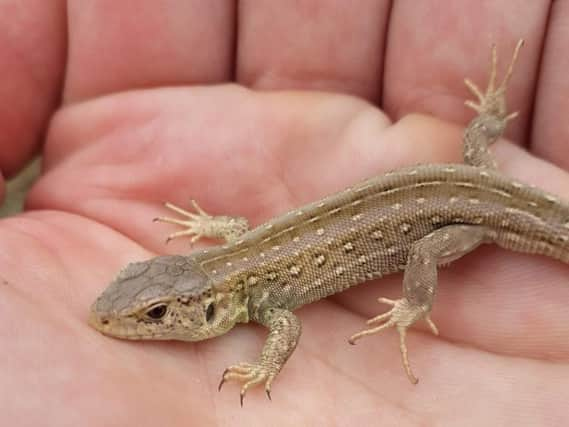Fylde sand dunes playing key role in conservation of rare lizard


Around 200 captive-bred sand lizards are being released on to the Fylde dunes this year as part of a long-term conservation project to restore the species’ status and historic range within the UK.
Fifty were released at the weekend with the aim of at least doubling the 100 or so released in each of the last two years under a joint project involving Fylde and Blackpool Councils as well as the Amphibian and Reptile Conservation, Fylde and North Merseyside Amphibian Groups, Lancashire Wildlife Trust and Natural England.
Advertisement
Hide AdAdvertisement
Hide AdGeoff Willetts, Fylde Council's senior coast and conservation officer, said: "Fylde Council is proud to be part of such a fantastic project and are privileged to witness the sand lizards re introduction to our beautiful sand dunes here on the Fylde Coast.’"
Andrew Mills, Fylde Council’s sand dunes area conservation ranger, said: “It has been a great project to be involved in.
“We have already had a success story with hatched eggs found, proving that the conditions here can support a healthy population of sand lizards.
“Sand lizards are such amazing animals and it’s such a shame that their range has reduced due to habitat loss and fragmentation.
Advertisement
Hide AdAdvertisement
Hide Ad“Hopefully projects such as this can help boost their population.
“It is an exciting time on the dunes, and I am looking forward to watching how the population develops.”
Coun Jim Hobson, Blackpool Council’s Cabinet Member responsible for the Environment and Climate Change, said: "It’s been a pleasure for Blackpool Council to be involved in this project. We are so proud to have worked in conjunction with such fantastic partners to protect the status of this wonderful species."
Alan Wright, Lancashire Wildlife Trust's campaigns manager, said: "This is an example of how wildlife benefits from organisations working together and sharing expertise. The fact that sand lizards will be more abundant on such a busy area as the Fylde dunes is wonderful news and can only be good for local nature in general."
Advertisement
Hide AdAdvertisement
Hide AdPaul Hudson and Ray Lynch of the Fylde Amphibian and Reptile Group, said: "We have been part of the nationwide sand lizard breeding program for the last eight years and along with other partners, we have been able to re-establish breeding colonies of the Merseyside race of sand lizard at various sites in west Wales.
"We are now in our third year at our Fylde Coast dune system and it is great that we have witnessed breeding success at what is now the most northerly site in England."
Jonathan Webster, chairman of the Amphibian and Reptile Conservation trustees, said: "We are delighted with the success of the sand lizard re-introduction programme.
"So far the partnerships have instigated 76 re-introductions to both dune and heathland sites in 12 vice-counties and restored the species to seven of these. Eighty per cent of these have been successful or going well and more are planned for the future.’
Advertisement
Hide AdAdvertisement
Hide Ad"We have high hopes for this re-introduction as the site is naturally suitable for the species and well managed by the Fylde Sand Dune Project partners.
"Ongoing surveys by trained site staff, volunteers and Amphibian and Reptile Groups of the UK will let us know how the species is doing in the long term, and when they start to colonise new areas."
Ginny Hinton, Natural England area manager , said: "This is a wonderful example of nature recovery in action. It’s great to have this iconic species back in Lancashire."
Comment Guidelines
National World encourages reader discussion on our stories. User feedback, insights and back-and-forth exchanges add a rich layer of context to reporting. Please review our Community Guidelines before commenting.